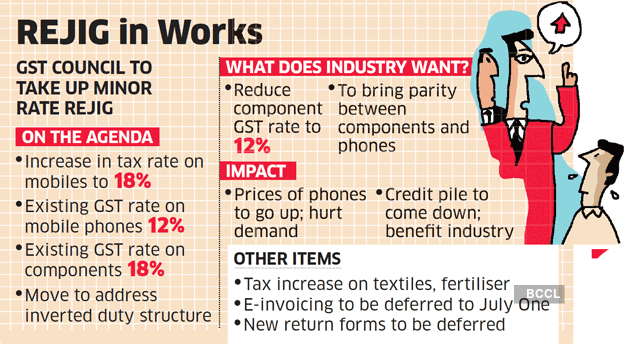The Goods and Services Tax (GST) Council is likely to consider a proposal to increase GST on mobile phones to 18% in its next meeting on March 14 to correct the inverted duty structure being faced by the industry, said officials in the know.
At present, mobile phones attract a 12% GST rate, even as several parts that go into making mobile phones fall under the 18% GST rate bracket, creating a case where the duty on inputs is higher than that on finished goods, leading to an inverted duty structure.
“The inverted duty issue on mobile phones has been brought up several times… it can be taken up this time,” said a senior official, who did not wish to be identified.
If the council were to accept the proposal, the rate increase would lead to a rise in prices of mobiles across categories, a move that would be detrimental to the industry which has been asking for a rate reduction to 12% on components so as to bring in parity with fully made mobile phones.
“Parts of printed circuit board assembly (PCBA) and other sub-assemblies or components are not being considered as parts of mobile phones and are therefore being charged GST at 18%, which needs a correction,” said Pankaj Mohindroo, chairman of the Indian Cellular Electronics Association.

He said that after the implementation of the phased manufacturing programme, PCBA began to scale up and now covers more than 90% of the PCBAs used in mobile phones in the country. Any move to increase the rate on fully made phones can worsen the impact on the industry, which is reeling under the difficulty in importing components from China amid the coronavirus spread.
The proposal is likely to be taken in the upcoming meeting this Saturday, when the council is likely to take up deferment of e-invoicing and QR code benefits, along with exemption on certain sections of the industry from undertaking einvoicing.
The council is also likely to take up several procedural relaxations, besides deferring the new return form which was to come into effect from April 1, said another official. EThad reported it earlier this week.
A third official said proposals to correct the inverted duty structure in fabrics, readymade garments and even fertilisers could also be taken up, as even in these cases the tax rate on raw materials is higher at around 12% while the finished goods are taxed at 5% rate.
Source : PTI
